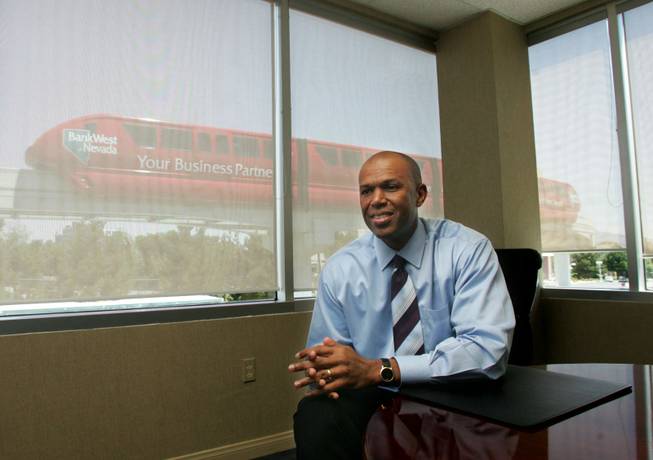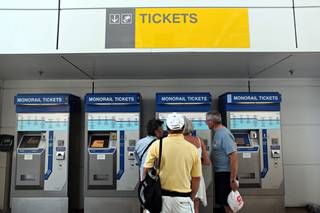
Sam Morris / FILE
Curtis Myles, president and CEO of the insolvent Las Vegas Monorail, expensed a $7,000 trip to China last year.
Wednesday, Feb. 17, 2010 | 2 a.m.
Sun Archives
- Las Vegas Monorail bonds downgraded after bankruptcy filing (2-5-2010)
- Las Vegas Monorail argues against bankruptcy as municipality (2-3-2010)
- After all the promises, will taxpayers be stuck with the monorail’s bills? (1-22-2010)
- Judge sets hearing date in Las Vegas Monorail bankruptcy case (1-19-2010)
- Las Vegas Monorail files for bankruptcy protection (1-13-2010)
Related Document
Beyond the Sun
When a federal judge decides today whether the Las Vegas Monorail’s bankruptcy should move forward, one of the hot topics is expected to be the way the transit operator spends money.
In addition to the high salaries for executives, the monorail resumed $5,000-a-month payments to its five board members last summer after reducing those fees to $2,500 a month in 2008 in what presumably had been a money-saving move. Monorail representatives say the increased payments reflected extra work board members were asked to do after it began contemplating a possible bankruptcy filing.
But the hearing before U.S. Bankruptcy Judge Bruce Markell is expected to touch on other expenses that have been questioned by participants in the case, such as a recent crisis management and communications contract to high-powered advertising agency R&R Partners and monorail President and CEO Curtis Myles’ trip to China last year.
The way the money was managed had been in the hands of Wells Fargo Bank until last fall when the monorail opened another account with Bank of America.
The monorail has accused Wells Fargo of abusing its authority as a trustee of the money by rejecting its request to make certain expenditures. The bank defended itself by claiming that the monorail was not properly spending money for operations and maintenance.
It questioned the legitimacy, for example, of the R&R contract and the China junket.
Two months before the monorail filed for bankruptcy protection, Myles signed a contract to pay R&R a $60,000 retainer to serve as its lobbyist, help develop the “messaging” of its business story, inform “appropriate stakeholders” of significant events involving it, represent it to hotels, and assist with media outreach.
The four-month contract expires Feb. 28, but the monorail has the option to extend it for three months at a time.
“We wanted some outside counsel, so it was a logical extension to turn to R&R,” said Monorail spokeswoman Ingrid Reisman, whose 2008 salary was $146,400.
Billy Vassiliadis, R&R’s CEO, said the firm has lobbied the Nevada Legislature on the monorail’s behalf since 2004 and performed damage control when the monorail suffered major mechanical problems.
“The only thing new with this contract is that we have stepped up our activity because of the bankruptcy,” Vassiliadis said.
As part of the contract, R&R agreed to lobby Clark County, the Regional Transportation Commission and other public entities on behalf of the monorail.
With speculation about a takeover of the monorail by the RTC or county, was the lobbying for that purpose?
Reisman and Vassiliadis said Tuesday that the communications R&R has engaged in so far have had nothing to do with a possible takeover. Instead, they said, the contract is merely an extension of work R&R has performed for the monorail.
Tracy Bower, RTC’s government affairs director, said “we have not been approached by R&R and we have not been approached about the possibility of taking over the monorail.”
In other court documents, Wells Fargo said it declined to reimburse Myles about $7,000 for the trip to China as the monorail did not explain “how the trip was reasonable and necessary, or even for operation and maintenance of the monorail.”
Myles’ 2008 salary was $346,777.
Scott Zuchorski, a vice president at Ambac Assurance Corp., which insured most of the bonds sold to build the monorail, said in a deposition that Myles told him the trip was to be paid for by developers of the proposed DesertXpress high-speed train that would run from Las Vegas to Southern California. Zuchorski said Myles said he was encouraged to take the trip to meet with potential DesertXpress investors who might also be interested in the monorail. Zuchorski also said Myles told him DesertXpress ultimately didn’t pay for the trip.
Rogich Communications Group Executive Vice President Lee Haney, speaking on behalf of DesertXpress, said: “I’m unaware of any trip that Curtis Myles took to China on behalf of DesertXpress.” Rogich Communications is headed by power broker Sig Rogich, a DesertXpress backer.
Reisman said she did not know the outcome of the trip or the extent to which DesertXpress may have been involved, but she confirmed that it was to meet potential investors who had backed other rail projects outside the United States.
“It’s our obligation to explore any kind of investment opportunity,” she said.


Join the Discussion:
Check this out for a full explanation of our conversion to the LiveFyre commenting system and instructions on how to sign up for an account.
Full comments policy